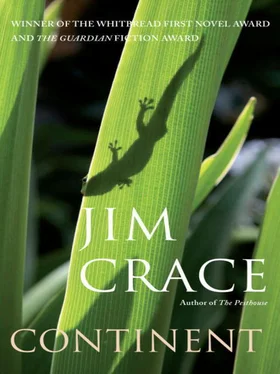But other papers in my father’s handwriting made me wonder. He noted her listlessness during the early days of their return from the forest, her reluctance to stay for long inside the house, the chaos of her digestive system as she encountered city foods for the first time. She lost weight. Her face, pert and cheerful by nature, thinned and paled. ‘The Professor took measurements, of course. What else? Her height, her cranial circumference, her daily temperature,’ said mother, awake and garrulous again with the photograph of the veranda party in her hand. ‘But he did not consult doctors. Doctors have colleagues. They gossip. Can you imagine the rapacity of these men, the anthropologists, the quacks, the weathercocks, the dilettantes, the journalists, the tuft-hunters, if under the cloak of science they could attend the village of the mating tribe. Communal intercourse, global mayhem. No, your father wanted Puppy all to himself. “She’s our secret,” he said. And so to our friends and the neighbours, she was just another country girl, none too bright, illiterate, clumsy, compliant. The men adored her.’
But my father, she said, seemed unmoved by Puppy’s innocence and charm. For him she was briefly, each morning, an object of scientific scrutiny, and then forgotten. Eventually the girl would be returned to her home, the village in the forest. But first he wished to monitor and chart her cycles. His charts survive amongst his papers — two columns of figures with dates relating to … two women? Only by standing amongst the cabinets and desks of what had been my father’s study could I construct from these numbers and chemical abbreviations a picture of my father in research. His daily readings measured the presence and absence of vaginal acids secreted during ovulation and that period of sexual excitement titled estrus amongst the lower mammals. The first column — Puppy’s? — recorded unbroken torpor. The second — my mother’s? — showed a conventional monthly cycle, the acids increasing towards the middle of the cycle and then decreasing.
Was this, then, the household ritual? Breakfast served and eaten. My father in his study coat, my mother in her morning clothes, Puppy in that white cotton dress and those incongruous gloves. The couch in the corner of the study. Sterilized bottles, cotton swabs. The forest girl, for reasons she could not quite guess but which she could have taken as some odd city custom, required to lie back and raise her knees while my father conducted his inspection and made his notes. And then my mother’s turn, her mistress, her hopscotch pal, submitting in the same room at the same time to reassure the girl that all was normal.
Once more, from mother, we heard her portrait of my father sharp-set and pestering in her presence, particularly on those days when swabs revealed her to be chemically receptive. ‘He’d been a studious bachelor for too long,’ she said. ‘Through me he was catching up on all those lost liaisons which should have occupied his youth instead of skeletons and dried skins and birds’ eggs. But I was not so foolish as I had been on our forest expedition. Look at his charts. You’ll see what games I played.’ Indeed, within four months of Puppy’s arrival the acid levels of my mother’s discharge in the ovulation stages of her monthly cycle halved, then quartered, and then (by the seventh month) disappeared entirely. ‘The Professor was perplexed,’ she said. ‘His appetites, poor man, were no longer justified by scientific data. He became less troublesome.’
In his journal, father wrote: ‘An unexpected development. My wife who has acted as a conventional control against whom I am able to verify the results of my experiments with P. continues to menstruate in a more or less regular pattern but her vaginal secretions of oliphatic acids have ceased. Her estrus levels now synchronize with those of P., unchanging from day to day, with no peaks or troughs to indicate sexual and reproductive readiness or periods of non-fertility. The two women now chemically harmonize and correspond in their sexual inertia. Here we observe the fact if not the mechanism of reproductive synchrony. Modern sexual licence comes into line with the more ordered ways of simpler times.’ ‘He was a fool,’ said mother, ‘and careless. I douched myself with potash soap in those days when my acids were expected. His swabs were worthless.’
Except, that is, when in the fourteenth month the daily swab taken from Puppy indicated a slight rise in its acid levels. My father took more swabs. He repeated the analysis. His findings were identical. My mother’s own secretions — the charts are here to prove it — showed no increased acidity on that or subsequent days. But, on the second day, Puppy’s small breasts were swollen, her cheeks were hot, the glands in her throat and armpits had hardened, her genitals had darkened. And her acids had doubled in strength. ‘This is it,’ said father, now hot and overwrought himself. ‘She’s in heat.’ ‘Good, good, good,’ he said to Puppy. ‘You will be famous.’ She smiled at the repeated words and at my father’s unusual turbulence, his breathlessness, his solicitude as he sat her at the chair of his desk and drew from its drawer his thermometer and his stethoscope and his speculum. My mother closed the door upon them and went to read and sleep elsewhere in the house.
AND THAT is the end of the story. Except for two columns of figures with dates, an entry or so in my father’s journal, a small figure in a single photograph, the cantankerous memories of a nonagenarian (whose loquacity stops there, at the closed door of my father’s study), where is the evidence that this girl, this Puppy, followed my parents’ donkeys from the forest to the city, that she lived in this creaking house, serving at the table and on the study couch? Search, if you will, amongst the papers and paraphernalia of the Zoea archive at the Institute. Nine hundred items from lecture notes on elephant musts and the monogamous gibbon to the manuscript of The Secret Life of the Tiger Crab chart my father’s lifelong reconnaissance of breeding chemistry and behaviour. Yet where are those people of the forest? And where is Puppy and those days of swabs and patience? My mother could not say. She soon forgot the conversations which had sustained us in the early phases of her illness. And once my sisters had returned to their families and left me, the spinster, here alone to cope, my mother would speak only of more recent years, the money that my father’s book brought in, the thankful respites of his trips abroad, his burial on the beach with the wind and the distinguished mourners and the bouncing of the shingle as it fell upon his casket throughout the weeping and the obituaries. She had been a widow a long time, she said, and she had no continuous memories of my father now, just snapshots from the family album.
While mother slept, I sat at my father’s desk with those three disquieting snapshots — the beach, the women, the veranda — and searched for a better ending to my mother’s story. His journal spoke of his ‘dear wife’, his ‘loyal companion in research’, ‘the angel who is mother to my girls’. But, otherwise, the notes were obsessively academic and dry. His dedication to the natural sciences seemed unbroken, humourless, without restraint. ‘I have been asked to prepare a pamphlet on the forest phenomenon,’ he wrote finally in his diary for 1926, ‘but I am not happy to proceed. It seems to me that the evidence is thin and that the absence for a year or more of menstruation and estrus in P. was possibly contingent on late puberty or the disruptions of weight loss, anxiety and digestive complications brought about by her hasty relocation in the town. Moreover, travellers from the Institute have not been able to establish the whereabouts of P.’s village. The plantation has been abandoned and, no doubt, her people have either descended like so many others to work on farms or to offer themselves in service in the towns, or they have withdrawn further into the trees, where, perhaps, it would be a kindness to leave them. At some later time all this would warrant an amusing memoir of conclusions rashly reached by a natural scientist too eager and ambitious. I smile at my younger self, but, for the moment, Uca felix calls and we — my wife, my three girls — are repairing to the coast.’ And nothing more.
Читать дальше












